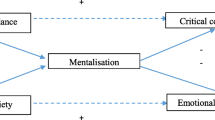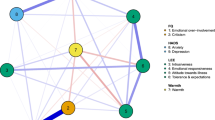Abstract
Purpose
To evaluate the contribution of positive affect in the family environment to relapse in first episode psychosis.
Method
65 service users with a first episode of psychosis were recruited into the current study along with their key relatives. Relatives were interviewed and rated using the Expressed Emotion (EE) measure of warmth, whilst service users completed questionnaires about the positive and negative affects that they perceived from the family environment. Associations between these measures and relapse were examined in a one-year prospective design.
Results
Service users were less likely to relapse within 6 and 12-month follow-up periods when their relatives were rated high on EE warmth, or when they perceived more positive affect from the family. The relationships between service users’ perceived positive affect and relapse were preserved after controlling for baseline symptoms, substance use and employment status. Service users’ perceptions of positive affect and EE ratings of warmth appeared to be stronger predictors of relapse outcome than criticism and other EE variables.
Conclusions
Positive family environments may protect against relapse in first episode psychosis. Psychosocial interventions should aim to foster and maintain positive affect in families during the early stages of illness. Further research is needed to understand the mechanisms linking positive affect and outcomes for people recovering from psychosis.
Similar content being viewed by others
Notes
The criteria for relapse meant that service users did not need to be experiencing an active relapse at the two end-points of the study to be classified as such.
A criterion of p < 0.1 was set for removal of predictors from initial models.
.
It was deemed more appropriate to control for the PANSS total score, rather than individual PANSS subscales to reduce the number of predictors in the regression analyses.
References
Nuechterlein KH, Dawson ME (1984) A heuristic vulnerability/stress model of schizophrenic episodes. Schizophr Bull 10:300–312
Butzlaff R, Hooley J (1998) Expressed emotion and psychiatric relapse: a meta-analysis. Arch Gen Psychiatry 55:547–552
Alvarez-Jimenez M, Priede A, Hetrick S, Bendall S, Killackey E, Parker A et al (2012) Risk factors for relapse following treatment for first episode psychosis: a systematic review and meta-analysis of longitudinal studies. Schizophr Res 139:116–128
Kuipers E, Lam D, Leff J (2002) Family work for schizophrenia: a practical guide. Gaskell Press, London
Barrowclough C, Tarrier N, Lewis S, Sellwood W, Mainwaring J, Quinn J et al (1999) Randomised controlled effectiveness trial of a needs-based psychosocial intervention service for carers of people with schizophrenia. Br J Psychiatry 174:505–511
Pharoah F, Mari J, Rathbone J, Wong W (2010) Family intervention for schizophrenia. Cochrane Database Syst Rev 8(12):CD000088. doi:10.1002/14651858.CD000088.pub2
Lopez S, Hipke K, Polo A, Jenkins J, Karno M, Vaughn C (2004) Ethnicity, expressed emotion, attributions, and course of schizophrenia: family warmth matters. J Abnorm Psychol 113:428–439
Ivanovic M, Vuletic Z, Bebbington P (2004) Expressed emotion in the families of patients with schizophrenia and its influence on the course of illness. Soc Psychiatry Psychiatr Epidemiol 29:61–65
Leff J, Vaughn C (1985) Expressed emotion in families. Guilford Press, New York
Greenberg JS, Knudsen KJ, Aschbrenner KA (2006) Prosocial family processes and the quality of life of persons with schizophrenia. Psychiatr Serv 57:1771–1777
O’Brien M, Gordon J, Bearden C, Lopez S, Kopelowicz A, Cannon T (2006) Positive family environment predicts improvement in symptoms and social functioning among adolescents at imminent risk for onset of psychosis. Schizophr Res 81:269–275
Bertrando P, Beltz J, Bressi C, Clerici M, Farma T, Invernizzi G et al (1992) Expressed emotion and schizophrenia in Italy: a study of an urban-population. Br J Psychiatry 161:223–229
Schlosser DA, Zinberg JL, Loewy RL, Casey-Cannon S, O’Brien MP, Bearden CE et al (2010) Predicting the longitudinal effects of the family environment on prodromal symptoms and functioning in patients at-risk for psychosis. Schizophr Res 118:69–75
Gonzalez-Pinto A, Ruiz de Azua S, Ibanez B, Otero-Cuesta S, Castro-Fornieles J, Graell-Berna M et al (2011) Can positive family factors be protective against the development of psychosis? Psychiat Res 186:28–33
Leff J, Wig N, Bedi H, Menon D, Kuipers L, Korten A et al (1990) Relatives Expressed Emotion and the course of schizophrenia in Chandigarh: a 2-year follow-up of a 1st-contact sample. Brit J Psychiat 156:351–356
King S, Dixon M (1999) Expressed emotion and relapse in young schizophrenia outpatients. Schizophr Bull 25:377–386
Fridgen G, Aston J, Gschwandtner U, Pflueger M, Zimmermann R, Studerus E, et al (2012) Help-seeking and pathways to care in the early stages of psychosis. Soc Psychiatr Psychiatr Epidemiol 48:1033–1043. doi:10.1007/s00127-012-0628-0
Norman R, Malla A, Manchanda R, Harricharan R, Takhar J, Northcott S (2005) Social support and three-year symptom and admission outcomes for first episode psychosis. Schizophr Res 80:227–234
Addington J, Jones B, Ko T, Addington D (2001) Family intervention in early psychosis. Psychiatr Rehabil Skills 5:272–286
Bird V, Premkumar P, Kendall T, Whittington C, Mitchell J, Kuipers E (2010) Early intervention services, cognitive-behavioural therapy and family intervention in early psychosis: systematic review. Brit J Psychiat 197:350–356
Vaughn C, Leff J (1976) Measurement of expressed emotion in families of psychiatric-patients. Br J Soc Clin Psychol 15:157–165
Tompson M, Goldstein M, Lebell M, Mintz L, Marder S, Mintz J (1995) Schizophrenic-patients perceptions of their relatives attitudes. Psychiatry Res 57:155–167
Lebell MB, Marder SR, Mintz J, Mintz LI, Tompson M, Wirshing W et al (1993) Patients’ perceptions of family emotional climate and outcome in schizophrenia. Br J Psychiatry 162:751–754
Barrowclough C, Gooding P, Hartley S, Lee G, Lobban F (2013) Factors associated with distress in relatives experiencing recent onset psychosis in a family member. J Nerv Ment Dis (in press)
Leff J, Vaughn C (1985) Expressed emotion in families. Guilford Press, New York
Parker G, Tupling H, Brown L (1979) A parental bonding instrument. Br J Med Psychol 52:1–10
Hooley J, Teasdale J (1989) Predictors of relapse in unipolar depressives: expressed emotion, marital distress, and perceived criticism. J Abnorm Psychol 98:229–235
Kay S, Fiszbein A, Opler L (1987) The positive and negative syndrome scale (PANSS) for schizophrenia. Schizophr Bull 13:261–276
Barrowclough C, Haddock G, Wykes T, Beardmore R, Conrod P, Craig T et al (2010) Integrated motivational interviewing and cognitive behavioural therapy for people with psychosis and comorbid substance misuse: randomised controlled trial. BMJ 341:c6325. doi:10.1136/bmj.c6325
Barrowclough C, Tarrier N, Lewis S, Sellwood W, Mainwaring J, Quinn J, Hamlin C (1999) Randomised controlled effectiveness trial of a needs-based psychosocial intervention service for carers of people with schizophrenia. Br J Psychiatry 174:505–511
Vasconcelos e Sa, D., Wearden, A., & Barrowclough, C. (2013). Expressed emotion, types of behavioural control and controllability attributions in relatives of people with recent-onset psychosis. Soc Psychiatry Psychiatr Epidemiol 48:1377–1388. doi:10.1007/s00127-013-0659-1
Stirling J, Tantam P, Thomas D, Newby L, Montague N, Ring S, Rowe S (1991) Expressed emotion and early onset schizophrenia: a 1-year follow-up. Psychol Med 21:675–685
Bentsen H, Munkvold O, Notland T, Boye B, Oskarsson K, Uren G et al (1998) Relatives’ emotional warmth towards patients with schizophrenia or related psychoses: demographic and clinical predictors. Acta Psychiatr Scand 97:86–92
Tempier R, Balbuena L, Lepnurm M, & Craig TK (2013) Perceived emotional support in remission: results from an 18-month follow-up of patients with early episode psychosis. Soc Psychiatry Psychiatr Epidemiol. doi:10.1007/s00127-013-0701-3
Halford W, Steindl S, Varghese F, Schweitzer R (1999) Observed family interaction and outcome in patients with first-admission psychoses. Behav Ther 30:555–580
Addington J, Burnett P. Working with families in the early stages of psychosis (2004) In: Gleeson JF, McGorry PD (eds) Psychological interventions in early psychosis: a treatment handbook. Wiley and Sons, Chichester pp 9–116
Fadden G, Smith J. Family work in early psychosis (2009) In: Lobban F, Barrowclough C (ed) A casebook of family interventions for psychosis. Wiley and Sons, Chichester, pp 23–46
Glick I, Stekoll A, Hays S (2011) The role of the family and improvement in treatment maintenance, adherence, and outcome for schizophrenia. J Clin Psychopharm 31:82–85. doi:10.1097/JCP.0b013e31820597fa
Lee G, Barrowclough C, Lobban F (2011) The influence of positive affect on jumping to conclusions in delusional thinking. Pers Indiv Differ 50:717–722. doi:10.1016/j.paid.2010.12.024
Lobban F, Postlethwaite A, Glentworth D, Pinfold V, Wainwright L, Dunn G et al (2013) A systematic review of randomised controlled trials of interventions reporting outcomes for relatives of people with psychosis. Clin Psychol Rev 33:372–382. doi:10.1016/j.cpr.2012.12.004
Acknowledgments
The authors would like to thank the Medical Research Council, UK for funding the doctorate studies of the first author, and also Merseycare Mental Health NHS Trust, for providing grant monies towards the RAP Study.
Conflict of interest
None.
Author information
Authors and Affiliations
Corresponding author
Rights and permissions
About this article
Cite this article
Lee, G., Barrowclough, C. & Lobban, F. Positive affect in the family environment protects against relapse in first-episode psychosis. Soc Psychiatry Psychiatr Epidemiol 49, 367–376 (2014). https://doi.org/10.1007/s00127-013-0768-x
Received:
Accepted:
Published:
Issue Date:
DOI: https://doi.org/10.1007/s00127-013-0768-x




